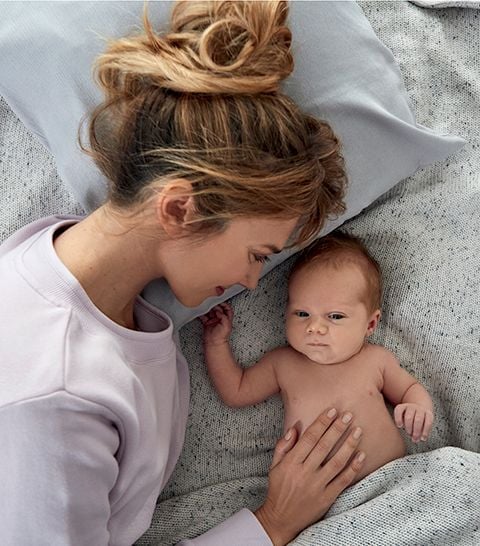
Common Pregnancy Symptoms
- Nausea (Morning Sickness): A well-known pregnancy symptom, nausea can be caused due to pregnancy hormones. While you can feel nausea anytime throughout the day, it is the most common in the morning.
- Tender Breasts: Changes in your breasts are one of the first signs of pregnancy. Once the egg is fertilised, your hormone levels will rapidly change causing your bosoms to become swollen, sore or tingly. Some women may even find them to be heavier, fuller or tender to touch. Your areolas, the area around the nipples, may also darken.
- Missed Period: While other pregnancy symptoms might go unnoticed due to our often busy lifestyles, missing your period after copulating is usually the first pregnancy symptom that captures our attention. Take a pregnancy test as soon as possible to confirm the good news!
- Food Aversions: Is the sight or smell of your favourite dish making your stomach churn? Or you can’t get enough of a cuisine you once disliked? This might be due to the hormonal changes during pregnancy that can change your sense of taste or make you sensitive to certain odours

Other Pregnancy Signs
- Spotting: The egg attaches itself to your uterus wall after being fertilised by a sperm. This can sometimes cause spotting, called implantation bleeding. It can happen anywhere from 6-12 days after fertilisation. Compared to the period cramps and bleeding, these are light and are often mistaken as the start of the period.
- Discharge: Apart from bleeding, you might also notice a white discharge from your vagina. After the sperm fertilises the egg, your uterine walls start thickening, and this increased growth of cells causes discharge.
- Fatigue: As soon as a week after the egg is fertilised, you may start feeling unusually tired. High levels of a hormone called progesterone can be the cause, along with low blood pressure, sugar and a boost in blood production might lead to excessive tiredness too.
- Mood Swings: Due to changes in your hormone levels, you may experience mood swings.
- Peeing Frequently: Between the sixth to eighth week of pregnancy, you might find yourself visiting the restroom more often. This is because of the increased amount of blood in your body that ends up in your bladder for your kidney to process.
- Constipation: If you are finding it harder to pass the stool, it may be a sign of pregnancy. Due to hormonal changes, your digestive system slows down leading to constipation.
- Runny or Stuffy Nose: Changes in hormone levels and increased blood production can also cause the mucus membranes in your nose to swell up, dry out or bleed easily resulting in a stuffy nose.

Am I Not Pregnant?
If you are not experiencing any of these symptoms yet, don’t lose heart. As discussed earlier in the blog, everyone’s pregnancy journey is different and you might experience a few or many of these symptoms later on. The list of early pregnancy signs listed above is only to be taken as a preliminary reference. A proper pregnancy test at home or a blood test at the doctor’s will give you a more accurate answer to your question.

How to Take a Pregnancy Test?
An at-home pregnancy test will be the first proper confirmation of your conception. These tests look for HCG in your urine to determine the results. They are 99% accurate when used correctly and are easily available at drug stores and grocery stores.
There are 3 types of at-home pregnancy tests:
- Place the test strip in your urine stream for about 10 seconds
- Pee in a cup and dip the test strip to get the results
- Pee in a cup and put a few drops of it on the test strip
No matter which one you use to take the test, remember the following points for accurate results:
- Read the instructions on the packaging carefully and follow each step exactly as directed
- Take the test with the first morning pee as HCG levels are the highest during this time
- Perform the test at least a week after you have missed your period for a definitive result
- Don’t drink an excessive amount of water before taking the test as this will dilute (thin out) your HCG
- Look out for the expiration date on the box

Next Steps
Positive results in your at-home tests are a great sign but for further confirmation and next steps it is important to book a doctor’s appointment. You can discuss your health history, get answers to any questions and concerns and plan for a healthy pregnancy with professional medical guidance.
If your test results are negative at first, try retesting. While at-home tests are highly accurate, there is a chance of false negatives. In case you are unable to conceive after trying for a year, visit your gynaecologist to identify potential causes, guidance on how to optimise your chances and to explore medications and treatments.




